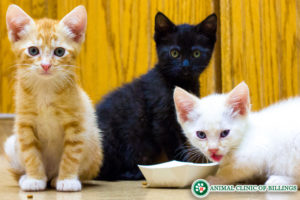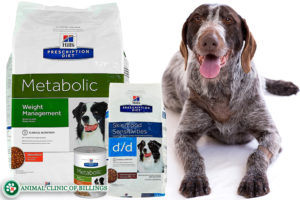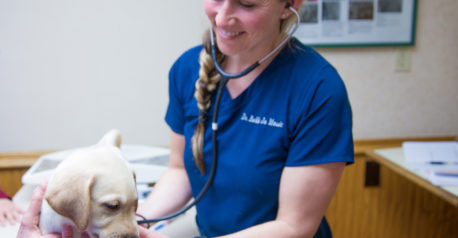Food & Nutrition
We have spent decades educating pet owners about optimal pet food nutrition for pets of every size, age, lifestyle, and medical conditions. These days, there are countless brands of dog and cat food to choose from, plus many alternative feeding options. The sheer variety of brands, flavors, and forms of pet foods available today is utterly bewildering and overwhelming—how is a conscientious owner to cut through the distracting advertising and marketing to determine which is really the best choice for their pet?
That is where our friendly vets come in—through detailed knowledge of your specific pet’s nutritional needs, they can help you pinpoint the ideal diet. Whether you have a puppy, an adult, or an elderly dog or cat, proper nutrition is critical to good health. Only through optimal nutrition can your pet reach their potential for growth, physical performance, and longevity.
Addressing Weight and Nutrition Issues
The best way to address excess weight or signs of potential malnutrition or dietary deficiency (underweight, poor hair-coat, low energy, etc.) is by implementing a responsible feeding plan designed by your veterinarian and choosing a vet-recommended well-balanced and nutritious adult dog food. Our veterinarians would love to help you select a diet to best meet the individual nutritional needs of your dog or cat. If you’re not sure of the best way to meet your pet’s dietary requirements, give us a call today and schedule an appointment with one of our veterinarians. At the Animal Clinic of Billings, our veterinarians cannot emphasize enough the importance of proper diet and nutrition during each stage of your pet’s life. Whether they are a baby, an adult, or a senior, optimal diets are available to meet their changing nutritional requirements.
Obesity has become a huge problem in certain pets, no pun intended. Just like in humans, being overweight has a very long list of potential medical consequences, including:
- Diabetes
- Respiratory Disease
- Heart Disease
- Kidney Disease
- Arthritis and decreased mobility
- Exercise intolerance
- Low energy
When your pet consumes more energy or food than their body uses for energy, those excess calories get stored as fat. Over time, fat will continue to accumulate, and the animal will become obese. The vast majority of pet obesity cases are simply the result of overfeeding, with lack of exercise also contributing. As long as a pet’s caloric intake exceeds the number of calories burned through activity and exercise, they will continue to remain overweight. If your pet is overweight or obese, it is essential to address it in a timely manner:
FIX YOUR PET’S DIET
The first step is to reduce your pet’s calorie intake. Implementing a diet low in starches and fat and high in fiber and protein will help your dog burn fat without feeling hungry. The right feeding methods and dog food recommendations should come from your veterinarian. Your veterinarian may recommend a prescription diet scientifically formulated to facilitate weight loss while maintaining satiety and preserving lean muscle mass. Cut down on treats, eliminate human food, and divide your dog’s daily food allotment into 3-4 meals to prevent your dog from feeling hungry.
INCREASE EXERCISE
Physical activity should be increased, both in frequency and duration. Work towards gradually increasing the length of exercise sessions as your pet’s level of fitness increases. Regular exercise helps to reduce appetite, change body composition, burn more calories, and increase metabolism.
No single pet food is ideal for all individuals
It is best to choose a brand that employs veterinary nutritionists, conducts extensive research on animal nutrition, performs long-term feeding trials to ensure the nutritional adequacy of each of their diets, and implements extensive quality-control testing. Unfortunately, many manufacturers encountered commonly in the pet food marketplace do not meet these requirements. Manufacturers that do meet these guidelines include Hill’s, Purina, and Royal Canine.
Beyond selecting a good life stage-appropriate diet, it is essential to feed the correct amount. Even when feeding an ideal diet, overeating can still have serious consequences for your pet’s health. Often, the recommended feeding amounts listed on food packaging are too high, and result in over-feeding and weight gain. Your vet can help you calculate the correct amount of your dog or cat’s specific diet to feed each day.
Best Cat Food and Nutrition
Cat nutrition is critical for the overall health of your cat, but selecting the right food from the hundreds of brands, and formulas on the market can be confusing. You want the best for your feline friend and the Animal Clinic of Billings is here to help. Unlike humans and various other creatures (including dogs), cats do not need carbohydrates in their diet. Like their wild, larger relatives, house cats have adapted to a protein and fat rich, carbohydrate-poor diet. Feral cats use plants for digestive regulation and dental support.
High-quality cat foods are formulated, keeping in mind both this evolutionary platform and feline nutrition requirements.
The Pros and Cons of the Three Main Types of Cat Food:
The three types of high-quality cat foods include:
- Kibble (dry)
- Pros: inexpensive and convenient
- Cons: Higher in carbohydrates than desired
- Canned (wet)
- Pros: Convenient, more nutritious than kibble
- Cons: More expensive than kibble
- Fresh (uncooked proteins)
- Pros: Most favorable wellness cat food diet
- Cons: Most expensive option, the majority of cats will not accept the change to fresh
At the Animal Clinic of Billings, we take pride in providing our patients and their owners the information needed to make sound decisions about feline nutrition. Cats can get very attached to specific textures of their food, and it is difficult to get them to accept or change to other forms of food. For this reason, we recommend you feed kittens a mix of canned and dry with the hope they will always accept both.
Kitten Food
 Kitten food is usually high in protein, calories, and fats, all of which are necessary to support healthy growth and body function. A regular feeding schedule coupled with the correct amount of food results in happy, growing cats. Our veterinary staff is glad to discuss the best kitten food options for your feline friend, as well as a proper feeding schedule.
Kitten food is usually high in protein, calories, and fats, all of which are necessary to support healthy growth and body function. A regular feeding schedule coupled with the correct amount of food results in happy, growing cats. Our veterinary staff is glad to discuss the best kitten food options for your feline friend, as well as a proper feeding schedule.
Kitten food comes from mother’s milk, or a commercial milk-replacer formula and given every 2-4 hours if the kitten is motherless. Kitten food becomes a dietary staple in the following stages, amounts, and frequency:
- 3-5 weeks of age: feeding kittens the milk-replacer formula in a dish to encourage weaning. You can also add a moist, chewable diet made up of a warm milk-substitute and high quality canned or dried kitten food 4-6 times a day.
- 5-8 weeks of age: your kitty should be chewing its own kitten food. Provide a protein-rich and energy filled diet, with feedings 3-4 times a day.
- There are many different kinds of kitten food available, and we are happy to discuss dietary options with you. Our veterinarians usually recommend canned kitten food because it emulates the natural diet both in texture and formulation. A proper diet can also be a combination of dry and canned kitten food.
- After 6 months of age: feed kittens twice a day.
Adult Cat Foods
Although dry cat foods are trendy, they should be considered the second choice for cat food. Dry foods have a higher carbohydrate count than desirable. Also, the protein choice tends to be higher in plants. The high levels of carbs and plant protein may lead to weight gain and digestive issues, especially in older cats. On the plus side, dry kibble is convenient and often the best choice for busy households. Most premium food brands have developed formulas of specialty, prescription dry cat foods, which are healthy choices for cats with allergies, or certain health conditions. This option can also be combined with a diet of canned or fresh food. Wet cat foods have low carbohydrate count, a nutrient count that emulates the diet cats would choose in the wild, and has a high-water amount. Natural cat food diets are high in unprocessed proteins, fats, vitamins, and minerals.
Senior Cat Foods
Once cats reach seven years of age, cats begin transitioning from adulthood to the mature stages of life. This transition causes health and lifestyle changes, including changes in:
- Weight
- Skin
- Joints
- Teeth
- Internal organs
- Lungs
If your cat is thriving on his current diet, you don’t need to change to a different formula. Some brands feature a senior cat food which is specially formulated for easy digestion. Older cats often to develop intestinal and kidney disease. Diets to benefit cats with these issues may slow the progression of these diseases. Your veterinarian will help you choose the right food for your senior feline friend.
BEST DOG FOOD AND NUTRITION
What is the Best Puppy Food?
Puppy food is formulated to meet the increased nutritional demands of rapid growth and development. Puppies should be fed a scientifically formulated puppy food beginning at approximately four weeks of age, as they begin to wean off of their mother’s milk. Young puppies do best when they eat at least 3 times per day. By 4 to 5 months of age, feeding frequency can be reduced to twice daily. Adhering to a strict feeding schedule will help establish a routine for your puppy that will, in turn, help with house training.
Overeating can become a problem in certain breeds if they are allowed to eat all they want, so do your best to monitor their weight and ask your veterinarian if your puppy might be developing any weight issues. Remember to refrain from overfeeding your puppy in an attempt to accelerate his or her growth, as growth rate is limited by genetics and excess energy will be converted to fat.
Each puppy is different, with individualized nutritional requirements. The right puppy food for your dog depends on many factors, including breed, size, growth rate, medical predispositions, and tendencies to overeat or self-regulate. In particular, large and giant breed puppies have different requirements for mineral and energy content than small and medium breed puppies, so it is important to feed these individuals a puppy food formulated for their breed type.
We recommend scheduling a nutritional consultation with one of our veterinarians to help you determine the best puppy food for your puppy.
What is the Best Dog Food for Adult Dogs?
No single dog food is ideal for all dogs. It is best to choose a brand that employs veterinary nutritionists, conducts extensive research on animal nutrition, performs long-term feeding trials to ensure the nutritional adequacy of each of their diets, and implements extensive quality-control testing. Unfortunately, many manufacturers encountered commonly in the pet food marketplace do not meet these requirements. Manufacturers that do meet these guidelines include Hill’s, Purina, and Royal Canin.
Beyond selecting a good adult diet, it is essential to feed the correct amount. Even when feeding an ideal diet, overeating can still have serious consequences for your dog’s health. Often, the recommended feeding amounts listed on dog food packaging are too high, and result in over-feeding and weight gain. Your vet can help you calculate the correct amount of your dog’s specific diet to feed each day.
The best way to address excess weight or signs of dietary deficiency (underweight, poor hair-coat, low energy, etc.) is by implementing a responsible feeding plan designed by your veterinarian.
What is the Best Senior Dog Food?
Generally, we consider a dog to be a senior after age seven, although this does vary somewhat based on breed.
- Small dogs – less than 20 pounds – 8 years of age
- Medium dogs – 21 to 50 pounds – 8 years of age
- Large dogs – 51 to 90 pounds – 6 years of age
- Giant dogs – 91 pounds or more – 5 years of age
Every senior dog is different, and so are their nutritional needs as they age. As long as your senior dog is doing well on its current diet, then you may not need to change anything. However, it is not unusual for older dogs to develop health problems that could greatly benefit from special diets tailored to address these conditions.
Additionally, most senior dogs will have decreased caloric requirements as their metabolism slows, while their requirements for protein may increase as the efficiency of protein digestion and absorption decreases. Most senior diets are designed to accommodate this change in nutrient requirements by reducing the carbohydrate and fat content while increasing the amount of high quality protein.
Supplements for Senior Dogs
Supplements can certainly be helpful for some conditions in senior dogs. It’s important to remember that each dog’s individual needs are unique, so always ask your veterinarian before starting your dog on any supplements.
Being honest and open with your veterinarian about any supplements you’re giving or would like to give your dog is always best as supplements could have adverse effects on specific medical conditions or may interact in a dangerous way with any medications they are on.
Feeding Dogs Table Scraps or Human Food
It’s no secret that most of us like to feed our dogs human food every once in a while. A small amount of cooked or raw vegetables (broccoli, green beans carrots, etc.) or cooked low-fat protein (boneless skinless chicken, fish, lean pork, lean hamburger, etc.) can be a healthy addition to your dog’s diet.
We recommend when giving your dog new human food that you introduce small items one at a time. This will help you identify if your dog has any digestibility issues or intolerance to the ingredient.
We recommend that you limit the amounts of any human food plus dog treats to a maximum of 20% of your dog’s total caloric intake, ensuring that at least 80% of their calories come from their maintenance diet. Remember that the calories from any treats or human food must be accounted for with a corresponding decrease in the amount of dog food fed to avoid weight gain.
Even if it doesn’t seem like a big deal, remember to review your diet plan with your veterinarian. In general, feeding them quality dry food with small amounts of whole foods is a healthy way to feed your dog.
What about Raw Diets for Dogs?
Raw diets have become popular in recent years. Their proponents claim that they are more natural for dogs, better preserve the food’s natural nutrients, and are more digestible. However, there are no proven benefits to feeding a raw diet, and there are some significant risks. Conventional processed diets do not have a significantly lower level of nutrients, and the cooking process actually increases the digestibility of many ingredients. Raw diets are frequently contaminated with dangerous bacteria, such as Salmonella, Listeria, E.coli, and Campylobacter, your dog seriously ill.
In addition, many raw diets contain bones, which can break a dog’s teeth (necessitating extraction) and cause serious injuries to their GI tract.
Schedule an appointment to discuss a nutrition plan for your dog
Proper nutrition provides your pet with the right amounts of all of the specific nutrients they need to reach their full potential for growth, health, physical activity, and longevity. These days, there are countless brands of dog food to choose from, as well as many alternative feeding options.
We have spent decades educating pet owners about nutrition for dogs of every size, age, medical condition, and lifestyle. Many of our clients are surprised to learn how important pet nutrition is to the quality of your pet’s life. We would love to help develop specific dietary recommendations to meet the individual needs of your dog.

Since 1981, our veterinarians and support staff have helped educate tens of thousands of dog owners about optimal canine nutrition. We love assisting pet owners in discover the positive effects of optimal pet nutrition for the bodies and minds of their four-legged family members.
If you would like to discuss canine nutrition with one of our veterinarians, please contact us or call one of our receptionists to schedule an appointment!
406-252-9499 REQUEST AN APPOINTMENT




